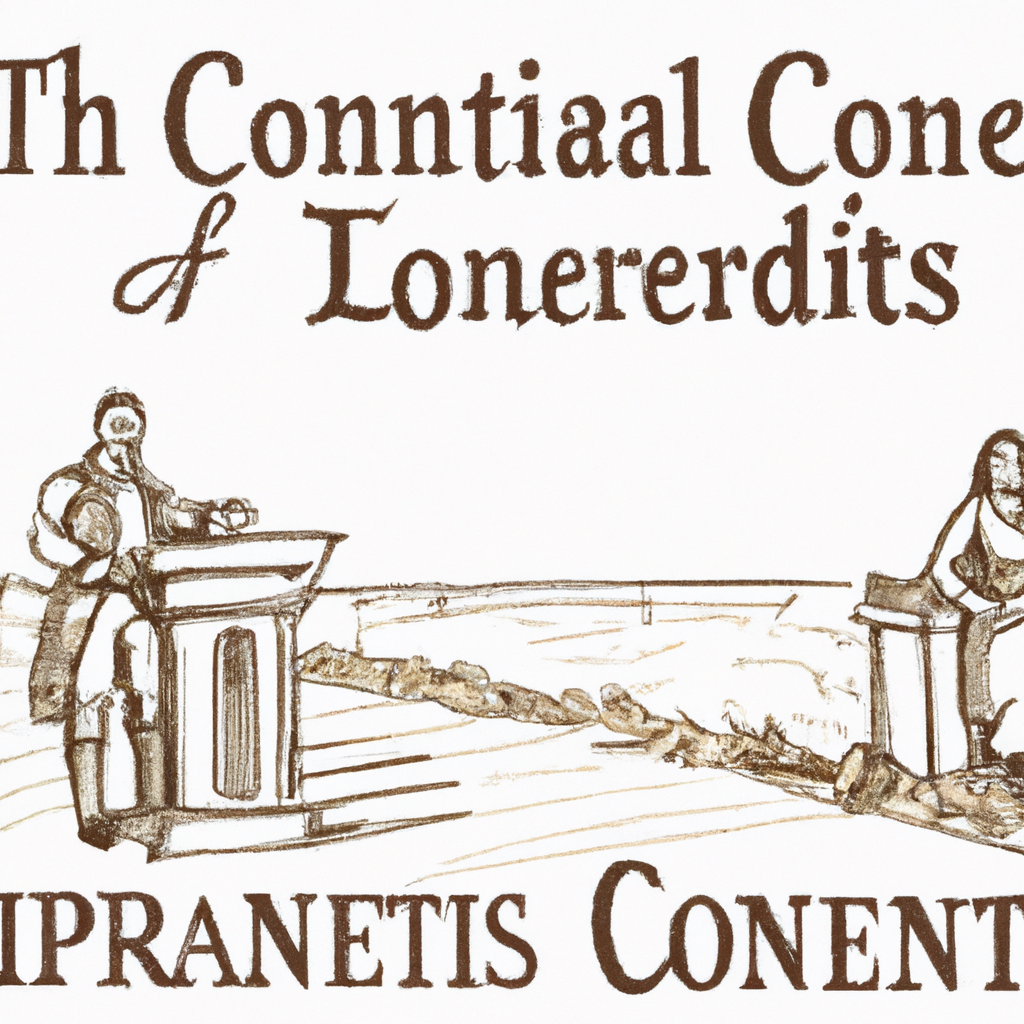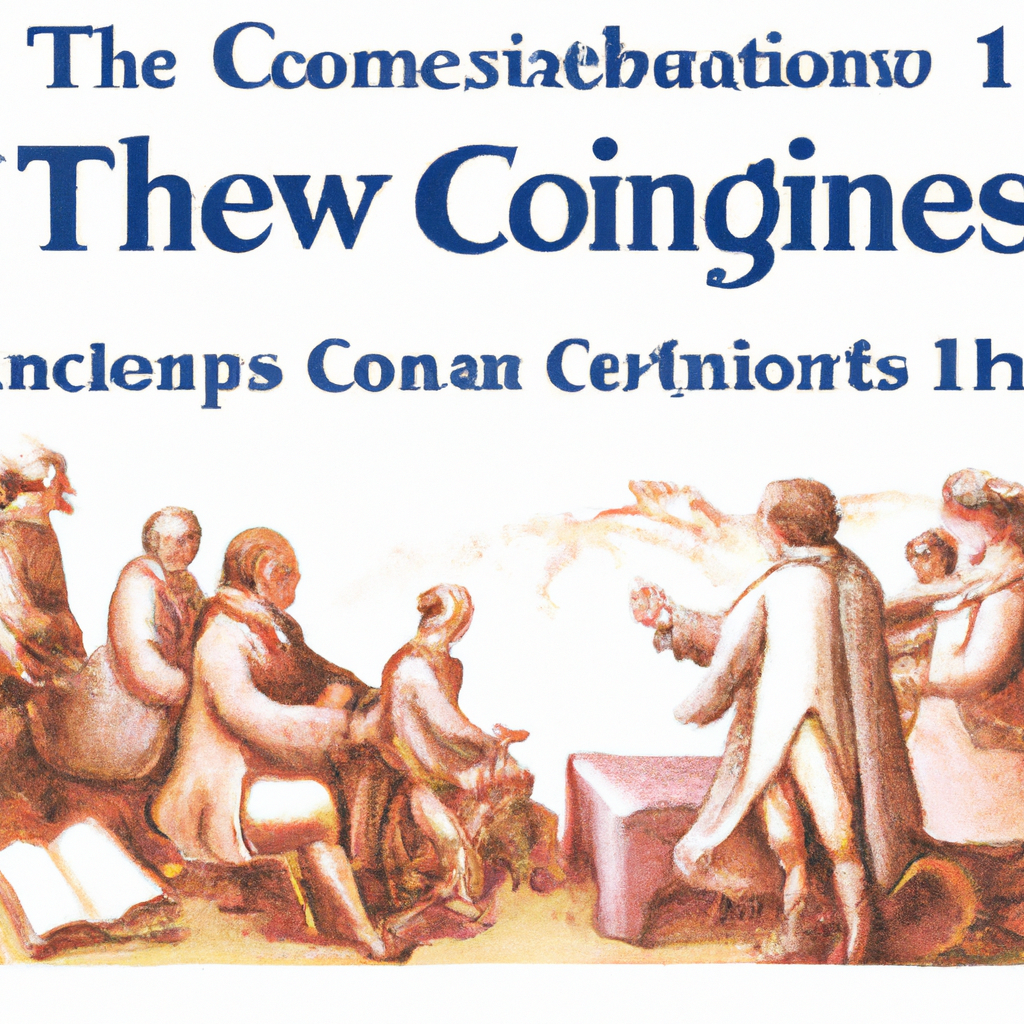The momentous events that occurred in1775 not only marked an important period in American history, but it set us on the path to freedom. The momentum of the American colonies determined to break free from British tyranny began with the Second Continental Congress, and this article will look at this seminal event in detail.
1. Early Beginnings: The Second Continental Congress
The Second Continental Congress was a remarkable gathering of representatives from the thirteen American colonies, assembled to discuss a plan for unifying the colonies in their attempt to fight against the oppressive rule of the British Empire. Seated in Philadelphia, the Second Continental Congress began its deliberations in the spring of 1775.
- Thomas Jefferson was among the notable participants in the Congress, appointed by the Virginia legislature to represent their interests.
- John Adams was participating in the Congress as part of the Massachusetts delegation, and was a devoted advocate of the colonies’ cause.
- Patrick Henry represented Virginia in the Congress, and made a passionate speech urging for the colonies to raise an army against the British.
The Second Continental Congress convened during a time of swelling anti-British sentiment, particularly with regards to taxation without representation. This sentiment was a driving force for the delegates to come to an agreement regarding the formation of a unified front against the Empire. Other than Thomas Jefferson and John Adams, Benjamin Franklin, Samuel Adams, John Hancock, and Roger Sherman were also influential members of the Congress.
At the end of the Congress’ deliberations, a unanimous resolution was issued that declared the establishment of a continental army. This appointed General George Washington as the commander-in-chief, and authorized the construction of a navy. Furthermore, the Congress declared itself an agent of the thirteen states, and this marked the birth of the United States Continental government.
The Second Continental Congress marked the beginning of the collaboration between the colonies, and many of the decisions taken laid the foundations of the nation we know today. Without the courageous actions of the representatives involved, it is unlikely the United States of America would exist.

2. Taking the First Steps towards Freedom
Seeing it Through
It can be difficult to take those first steps. When you first embark on a path to freedom, it can be harder to remain committed. It takes resolve and dedication to keep going. Remember that freedom is never truly achieved overnight, but rather comes in increments. Stay focused and don’t give up!
Acknowledging Fear
Be aware that fear can sometimes rise up in moments like these. That’s natural! It’s important to recognize fear and tackle it head on. Acknowledge the fear inside, then move forward and take action. You may take baby steps at first, but progress will happen if you remain persistent.
Setting Goals
Creating goals helps focus the mind and provide a clear sense of direction. It also serves as a powerful motivation. Aim for achievement on a short-term and long-term basis. Set monthly, weekly, and even daily tasks in order to stay on track. Satisfaction will come from achieving these goals and will help propel you forwards!
Surrounding Yourself with Support
Gather your support network around you. This could be of friends, family, or even your online community. Or you may already possess a powerful inner strength. It’s essential to identify sources of strength, which could be:
- Positive affirmations
- A strong belief system
- An optimistic outlook
This is important in helping to build self-confidence and sustain motivation.
Self-Reflection
Making time for self-reflection is just as important. Take a few moments each day to check-in with yourself. Find a peaceful and quiet place and ask yourself questions such as:
- What can I do today to get closer to my goals?
- What areas do I need to work on?
- How can I make things better?
Answering these questions will help provide a greater clarity of purpose and help motivate you towards further progress.
3. Forging the Path to Independence
As our country begins to take its first steps towards independence, we must build bridges between the past and the future. To do this we must pay attention to those who have forged the path before us. The sacrifices of revolutionaries, both old and new, have opened the door to unprecedented opportunities, bringing forth a nation of strong, independent citizens preparing for the future.
The very fabric of the American society is made up of those who have championed individual rights and liberties. From the Founding Fathers to modern-day leadership, citizens have fought to make their voices heard and to shape the hallmarks of freedom.
Individuals and groups have pushed back against the status quo, fighting for civil rights, voting rights, and the freedom of expression. With each successful advancement, more hope is kindled for what is possible for a nation of strong, independent citizens.
Every step of progress has ushered in a new national spirit, uncovering unique paths to lasting and meaningful independence. With each generation, the progress made forward is manifested in more opportunities to take risks, think critically, and break down boundaries.
There is no single way to make the journey, but the collective courage of our citizens has made great strides. The power of collaboration has given voice to diversity, inclusion, and expression, enabling us to build a nation where we can live, create, and thrive. Forging a path to independence is no easy feat, but together we can pave the way for a better future.
4. Charting Courageous Steps for a New Nation
The dawn of America was a time of ultimate courage. Many brave souls put it all on the line as they forged a nation built on the fundamental values of freedom, justice, and unity. As the nation emerged, nations were pushed, boundaries were tested, and greatness was achieved. Here are four courageous steps taken on the road to nation-building.
- The Founding Fathers: The Founding Fathers took the first steps toward a new nation by drafting The Declaration of Independence and, later, the Constitution. This was a bold move, forming a country with no precedent and no assurance of success. It was a giant leap of faith into a future of freedom.
- The Revolutionary War: The Revolutionary War tested the courage of the newly birthed nation. Unmotivated by the attainments of glory or profit, the determined colonists pushed back against British rule and won their freedom. This decisive action showed the world the power of the American spirit.
- The Louisiana Purchase: The Louisiana Purchase opened up a vast new area for colonization and expansion. This was considered a groundbreaking move and was an instrumental development in forming the modern United States of America.
- The Lewis and Clark Expedition: Climaxing the courageous steps taken by the Founding Fathers, the Lewis and Clark Expedition set forth in an ambitious attempt to explore the newly acquired land and explore the uncharted West. Despite many risks, the team successfully accomplished their mission and opened the newfound land to settlement.
These four courageous steps taken for a new nation marked the start of a journey that persists to this day. They represented the emergence of a powerful nation and a new era of opportunity. The Founding Fathers, the colonists, President Jefferson, and Lewis and Clark bravely set off into the unknown with confidence, and their actions have had a lasting impact on the course of history.
The Second Continental Congress set the stage for many of the freedoms we enjoy today. By galvanizing the Revolutionary spirit and drafting the Declaration of Independence, it helped forge a new path for the United States of America. We owe a great debt of gratitude to the delegates of the Second Continental Congress for their courage and foresight in laying the groundwork for our nation’s freedoms.
